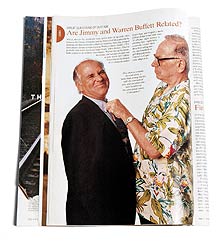It turns out that 23andMe isn’t just a startup idea that’s waiting for technology to catch up.In 1999, Fortune Magazine posed the question, “Are Jimmy and Warren Buffett Related?â€This week, 23andMe revealed the long-awaited answer, which is that the two Buffetts – well, let’s save that for the end.
Apparently Warren Buffett (finance guru) and Jimmy Buffett (musician), have always wondered if they are related to each other, potentially through a common ancestor who lived in a penal colony in the South Pacific.Earlier this year Anne Wojcicki, the co-founder of 23andMe, asked Jimmy and Warren if they would submit DNA for analysis.According to Warren Buffett’s assistant, he “just kept spitting into a little receptacle, and then we FedExed it.Not very elegant.â€23andMe then did Y chromosome and mtDNA analysis of Warren and Jimmy’s DNA. ... Click to read more!



 Admit it, you’re dying to get your hands on Watson’s genome, aren’t you? Who isn’t?! Yesterday
Admit it, you’re dying to get your hands on Watson’s genome, aren’t you? Who isn’t?! Yesterday 